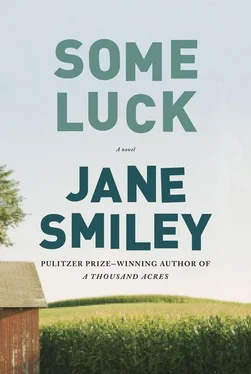The good thing was that Frank sat behind Bobby and could watch him without being noticed. He could also see into his desk whenever Bobby opened it. It was a mess in there. But looking in there gave Frank a perfect idea, and an easy one, too.
When he got home from school, it was still light. Mama was walking back and forth in the front room with Lillian in her arms, watching for him out the window, as she did every afternoon. He only had to walk a quarter-mile on his own, and that was on the road — the rest of the way, he walked with Minnie, Matthew Graham, and Leona Graham, who was thirteen, one of the plain girls. From the schoolhouse to the Grahams’ was through the fields, but Mr. Graham took the horses out and stamped down the snow for them. With Minnie, he went another bit, and then Minnie’s ma, in her apron, watched him until he was well on his way and could see his own barn.
He stepped onto the porch; Mama set Lillian in her downstairs cradle, opened the front door, and helped him off with his boots. Joe came out of the kitchen, his thumb in his mouth, but didn’t say anything. No, he did not want anything to eat. Yes, he had had a good day at school. Frank knew he couldn’t express any desire to go to the barn or even to go upstairs; Mama was suspicious of his motives at all times. She said, “You carry your coat through the house and hang it in the back hall, Frankie.” It was when he was doing this that he saw it — one he had forgotten — a nice-sized mousetrap, big enough to hurt but small enough to go into the desk, in a dark corner. He looked at it, but he didn’t touch it, because Joey was right behind him.
Joey had a way of sensing that Frank was up to something, so, for the rest of the evening, when Frank was in the house, Joe was right beside him. Frank did look for other traps when he was out helping Papa and Ragnar with the cows and the horses and the sheep, but the traps he saw were too big — he could tell just by looking that he wouldn’t be able to hide one of them in Bobby’s desk. Papa wouldn’t let him out of his sight, either, just like the others. Frank was patient. Nobody thought he was patient; someone was always saying, “Hold your horses, Frankie.” But he had stores of patience they could not understand if there was something he really, really wanted to do.
It was when he was getting ready in the morning for his walk to school that he managed to kick the mousetrap very gently with his toe. It snapped, the bait jumped, and Frank slipped it into his pocket. He could feel it — the edge of the trap was sharp, and the spring (he could tell by the way it snapped) was a good one. He buttoned his coat, went out on the porch for his boots, and then put on his hat and mittens. Mama stood just inside the door, holding Lillian and keeping out of the wind. She kissed him goodbye. The last thing she did was to look right at him and say, “If you’ve got some mischief in your head, young man, get rid of it.”
Frank returned her gaze and shook his head. Then he said, “I’m good, Mama. Miss Jenkins played the piano yesterday and let me sing the verses all by myself. Everyone else did the chorus.”
“Well, stay good, then,” said Mama, before slamming the door. But even after she went inside, he didn’t put his hand in his pocket. At Minnie’s, Mrs. Frederick gave him a sugared doughnut “to keep him warm,” and they trotted onward to the Graham farm. It was cold enough so that the snow was hard, but not that cold. Minnie didn’t try to hold his hand. Frank was not sure she had seen him get pushed down the day before.
He decided that he had to keep quiet, but not strangely quiet, and he did — he spoke when spoken to and did what he was told, and when something the other boys thought was funny happened, he laughed with them. Already, after only four months of school, he saw that if you didn’t laugh when the others laughed, they hated you all the more. So he was required to laugh when Bobby tripped Alice Canham as she was making her way back from the pencil sharpener. Right after lunch, he had a moment alone in the classroom, during which he set the trap and placed it in his own desk, ready for business.
The problem was that Miss Jenkins lined them up and herded them everywhere — into the classroom in the morning, out for recess, back in, back out, back in, then dressed and out the door for home. Yes, she couldn’t see much, but she would see him go into Bobby’s desk. That night, Frank lay awake in his bed next to Joey, trying to think of something, but he fell asleep.
He had never paid much attention to Bobby Dugan — he’d only tried to stay out of his way — but now he watched him carefully. The first thing he saw was that Bobby rolled and smoked a cigarette with Dallas and Howie during recess, out by the corner of the schoolyard. They did it again after eating their lunches. Frank didn’t know anyone who smoked. He also saw Bobby go into the privy and come out after spending a long time there. When Frank went into the privy sometime later, he stayed long enough to look all around. He stood on the seat on his tiptoes, reached up, and felt where the roof came down to meet the wall. He found the box of tobacco and matches pushed to the back of the space there.
First thing in the morning when he got to school, he went up to Miss Jenkins and whispered that he wasn’t feeling well, and might have to go to the privy. Since it was a very cold day, could he keep his coat on in class? Miss Jenkins felt his head, and Frank said, “Mama says I don’t have a fever.”
“No, you don’t. Well, we’ll see how you feel. If you need to go home at lunchtime, we’ll see.”
When Miss Jenkins had some older kids at the reading table, Frank slipped the mousetrap into his pocket, then he huddled at his desk for the first hour, all through geography. Just at the right moment, he thought, he staggered out of the room and headed for the privy. He went in and closed the door. He climbed onto the seat, carefully set the trap, and placed it on the box of tobacco, a little pushed back. He coughed a few times and, once back in the schoolroom, staggered to his seat. In the next half-hour, he revived; by lunchtime, he had removed his coat and hung it on his hook.
After lunch, it worked perfectly. Dallas stole Leona Graham’s cookie, and instead of eating it, crushed it under his toe in the snow, laughing; then he, Howie, and Bobby set off for their spot, even though Miss Jenkins called after them. Bobby headed toward the privy on the way. Sure enough, moments after he disappeared, Frank heard a yelp and then some bad words. Miss Jenkins went to the door of the privy, and when Bobby came out with his fingers in his mouth, she said that she would have to make a report to his father. Then she saw the box in his hand, and held out her own. He reluctantly gave it to her. She opened it and saw the papers and the tobacco. She started shaking her head. After that, Bobby didn’t come to school for a month. Minnie told him that Bobby’s dad had him cleaning hog pens the whole time.
WELL, that dog had puppies. Mama didn’t find them for almost two weeks, but Joe knew they were there. He had been going behind the barn and watching them for ten days by that time. There were five of them — there had been seven, but two died, and Joe dug a little hole under the Osage-orange hedge, on the far side, where he knew no one would go, and wrapped each puppy in a handkerchief that he took out of the washing, and buried them together. Even Frankie didn’t see him or know what he was doing, and for sure, Joe did not want Frankie to find the puppies, so he kept them as the best secret he’d ever had.
The dog was a stray — when it came around during the fall plowing, Mama thought sure it was carrying something, rabies maybe, and she wanted Papa to shoot it, but Papa said it looked like a shepherd of some sort, and then, in the winter, when the sheep were outside, the dog was good at bringing them in. It was brown and white, with one blue eye. Joe petted it on the head when no one was looking, and sometimes the dog swished its long tail when it saw Joe, but the dog seemed to know that their friendship was a secret. He named the dog “Pal,” but he never said that name aloud. After the puppies were born, Joe brought the dog things from time to time — half of his sausage from dinner, a hard-boiled egg from breakfast, a piece of bacon. Mama didn’t see everything, and neither did Frankie, and that was a fact.
Читать дальше












